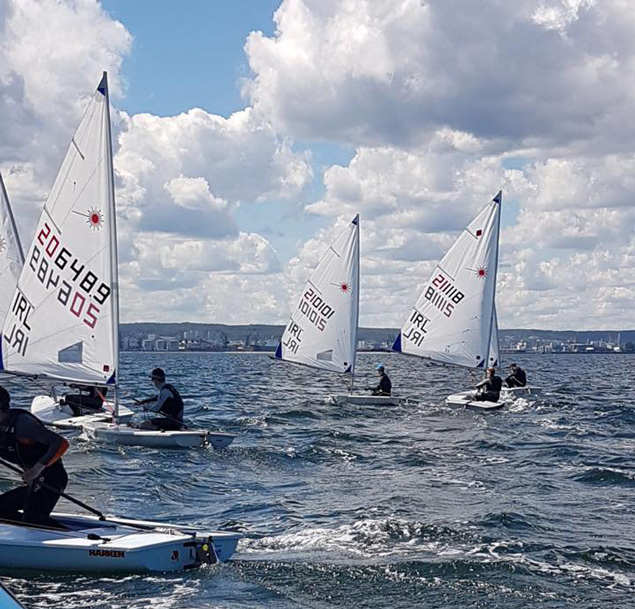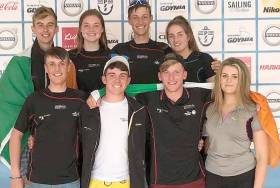Displaying items by tag: Ewan MacMahon
Lynch and McMahon Wait for Wind in Athens as Both Irish Olympic Trialists Make Top 25 of ILCA 7 World Rankings
As the second trial for the Irish Paris 2024 nomination was becalmed in Greece today at the ILCA7 European Championships, the February World Rankings reveal both Irish trialists are in the top 25.
Finn Lynch (National Yacht Club), who finished ninth at January's World Championships, is ranked 15th, while Ewan McMahon (Howth Yacht Club) reaches a new high at 25 in his independent 'Green Rebel' campaign.
High pressure over Athens left competitors without racing on the opening day of the Championships (Sunday, 18th February).
Lynch and McMahon were amongst the 141-boat ILCA7 class left waiting for the breeze to arrive. Although the fleet eventually went afloat, no racing was possible.
 Top class sailing from Finn Lynch put the National Yacht Club sailor into the medal race of the ILCA 7 World Championships in Adelaide, Australia in January and puts him 15th in the world rankings Photo: Jack Fletcher
Top class sailing from Finn Lynch put the National Yacht Club sailor into the medal race of the ILCA 7 World Championships in Adelaide, Australia in January and puts him 15th in the world rankings Photo: Jack Fletcher
A similar forecast is predicted for Monday, though there are indications of wind for Tuesday.
Lynch has the upper hand on McMahon after the first of three trials at the Australian World Championships, but with a light wind forecast and some significant absences in Athens this week, there is an opportunity for McMahon.
As Afloat reported last November, despite achieving the necessary published criteria at a recent World Cup, the McMahon campaign says that his application for Sport Ireland funding for 2024 was "disallowed following a decision by Irish Sailing (IS) to invalidate the event’s qualification status".
The ISA then determined that the World Cup event in Almere did not meet the “minimum standard of fleet” to qualify as a carding event under the 2024 Carding Scheme rules.
Whatever the criteria may be, with only two sailors campaigning, February 2024's world rankings represent a standard McMahon's campaign will no doubt say merits his inclusion on the national team, which currently has only one ILCA 7 member.
The next wave of Irish Laser Olympic prospects were out in force at the Radial Youth Sailing European Championships from 6th–13th July in Gdynia Poland.
Conditions were light for most of the event with strong winds on the last day.
In the boys fleet, Irish youth champion Ewan McMahon of Howth Yacht Club showed a consistent performance to finish eighth in the Gold fleet. Royal Cork's Johnny Durcan was 17th with the National Yacht Club's Loghlen Rikard 24th. Conor Quinn of Rush SC was an individual race winner and finished 31st. MacMahon's younger brother Jamie was 41st and seventh in the U17 category.
 Ireland's next generation of Olympic sailors were out in force in Poland. Ewan McMahon and Sally Bell finished 8th and 10th in boys and girls respectively at the Laser Radial Youth Europeans in Poland. Photo: ISA
Ireland's next generation of Olympic sailors were out in force in Poland. Ewan McMahon and Sally Bell finished 8th and 10th in boys and girls respectively at the Laser Radial Youth Europeans in Poland. Photo: ISA
Fionn Conway and Peter Fagan were 50th & 51st and Henry Higgins was 60th in Gold fleet.
Peter Gilmore, Andrew Mitchel and Hugo Moran were Silver and Bronze fleet finishers.
Three Irish girls competed at the event for the first time. Sally Bell of the Royal North Ireland YC was a top finisher in tenth overall in the girls division.
Nell Staunton of the National YC, who has just returned to sailing after a foot injury, finished 16th.
Tara Coveney RCYC/RSt George put in a really strong challenge but was unfortunate to break her tiller extension on one day finished 46th and 10th in the U17 division.
A link to the event website results section is here
Additional report from Irish coach Russell McGovern:
The Irish Laser youth academy travelled out to Poland at the start of July for final preparations for competing at the Youth European Championships.
The team was Sally Bell, Nell Staunton, Tara Coveney, Ewan McMahon, Jamie McMahon, Johnny Durcan, Loghlen Rickard.
The squad had been sailing full time from the end of May and were in good spirits. We had been using the Royal Irish Yacht Club as our base and sailing 5 to 6 days a week with a tough physical program too.
They had done a warm up regatta in early June in Hoorn and had won that but also high lighted some areas to work on which was the reason for attending, so going to Gdynia they knew they in good shape.
The venue was always going to be difficult to get consistent racing in due to the synoptic situation that is common in that part of the Baltic in the summer, and to Quote the RO
“this place in bonkers”. However, he did manage to get 10 races in over the 6 days of racing.
The first day was a 10 hour day on the water with 2 races cancelled and re run, and some awesome thunder storms and this was to be the trend until the last day. It was a difficult race course to manage with 70 degree wind shifts, light breeze and 4 fleets of 60 boats, however the team put in some solid results and sailed with a very positive and level approach just as they would in training.
After the 3rd day the Girls where in a strong position sitting just outside the the top 10 and the boys where now to be split into finals which they all made gold fleet, Ewan and Loghlen in the top 10 and Jamie and Johnny with in touch of top 20.
The first day of Finals saw the boys and Girls have there toughest day of the entire regatta where they were in the top group and in both races saw the fleet change on the 2nd upwind with a 90 degree wind change, and with such slow boat speeds it was nearly impossible to chase over to catch the change once spotted.
The last day we woke to an 18-22 kt northerly breeze with short steep waves, and this saw the team dominate the day and to open things saw Sally score a 1 and 5.
Nell who has just come back from injury scored a 5 and 8 and Tara who is the newest member of the squad lead the first race of the day and went on to score a 14 and 7.
While on the gold fleet boys it was something similar with Ewan scoring a 1-6 and Johnny scoring 2-1 with the other lads right up there but having a few spills pushing it hard down wind.
All in all it was a great event and highlighted some areas to work on in prep for the worlds in August in the Netherlands.
If these young sailors stay in the sport and keep progressing at the current rate of knots the future will surely be bright for Irish Sailing.





























































